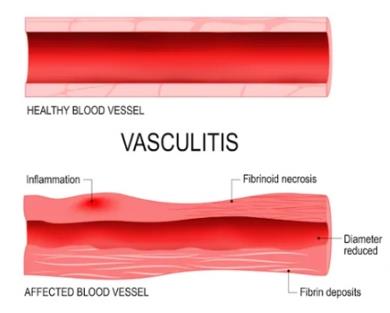 Vasculitis refers to autoimmune diseases caused by various reasons, with inflammation of fibrinoid necrosis in the blood vessel wall or perivascular tissues as the main characteristics. The clinical symptoms of patients vary according to the type, size, location, and pathological characteristics of the affected vessels, including systemic symptoms such as fever, night sweats, and fatigue, as well as local symptoms such as pathological vascular ischemia and corresponding organ dysfunction. When there are significant systemic manifestations that multiple systems are involved, it is also called systemic vasculitis. The etiology of vasculitis is complex, including genetics, endocrine, infection, tumor, chronic inflammatory diseases, drugs, environment, etc. The pathogenesis is unknown, and it may be that the pathogenic factors directly destroy the vessel wall, or that the immune mediator leads to the vascular wall to produce the inflammatory response.
Vasculitis refers to autoimmune diseases caused by various reasons, with inflammation of fibrinoid necrosis in the blood vessel wall or perivascular tissues as the main characteristics. The clinical symptoms of patients vary according to the type, size, location, and pathological characteristics of the affected vessels, including systemic symptoms such as fever, night sweats, and fatigue, as well as local symptoms such as pathological vascular ischemia and corresponding organ dysfunction. When there are significant systemic manifestations that multiple systems are involved, it is also called systemic vasculitis. The etiology of vasculitis is complex, including genetics, endocrine, infection, tumor, chronic inflammatory diseases, drugs, environment, etc. The pathogenesis is unknown, and it may be that the pathogenic factors directly destroy the vessel wall, or that the immune mediator leads to the vascular wall to produce the inflammatory response.
The examination methods for vasculitis include the following:
Creative Biogene's products are mainly for the detection of breeding antibodies to diagnose vasculitis, and use enzyme-linked immunoassay to qualitatively and quantitatively determine the IgG antibody of GBM, CIC-C3d, etc. in human serum or plasma. Our product can quickly detect autoantibodies produced when vasculitis occurs, and is one of the effective methods for vasculitis detection. The advantages of our products are simple operation, accurate detection results, sensitivity and specificity.
Creative Biogene is an expert in the field of vasculitis diagnosis. It is sincerely looking forward to cooperating with you and providing you the best quality product with all of our hearts! You can choose us without hesitation.
Please contact us for more details.
Reference
| Cat# | Product Name | Product Type | Inquiry |
|---|---|---|---|
| C0501T | ANA Hep Screen ELISA | Test kit | Inquiry |
| C0502T | ANA Profile ELISA | Test kit | Inquiry |
| C0503T | ANA Screen ELISA | Test kit | Inquiry |
| C0538T | Autoimmune disease test strip | Rapid test | Inquiry |
| C0539T | Autoimmune disease test kit | Test kit | Inquiry |
| C0540T | CIC-C1q ELISA | Test kit | Inquiry |
| C0541T | CIC-C3d ELISA | Test kit | Inquiry |
| C0542T | MPO-Ab (p-ANCA) ELISA | Test kit | Inquiry |
| C0543T | PR3-Ab (c-ANCA) ELISA | Test kit | Inquiry |
| C0547T | ANCA Profile ELISA | Test kit | Inquiry |
| C0548T | ANCA Screen ELISA | Test kit | Inquiry |
| C0549T | ANCA-C (PR3) ELISA | Test kit | Inquiry |
| C0550T | ANCA-P (MPO) ELISA | Test kit | Inquiry |
| C0551T | GBM Ab ELISA | Test kit | Inquiry |
Copyright © 2026 Creative Biogene. All rights reserved.